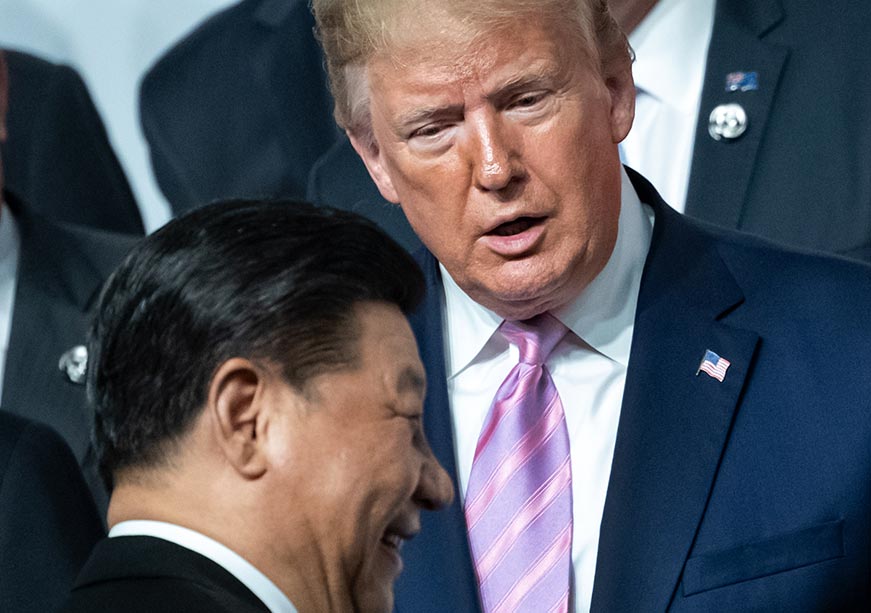-
CENTRES
Progammes & Centres
Location
Trump’s incoming presidency is set to intensify and institutionalise the hawkish approach to China initiated in 2017

Image Source: Getty
This article is part of the series, "Reignited agendas: Trump’s return and its global repercussions"
After Donald Trump’s victory in the United States (US) elections this month, cooperation has become the mantra in Beijing. In his congratulatory message, Chinese President Xi Jinping emphasised that, throughout their bilateral history, China and the United States have suffered from confrontation but benefitted from cooperation. He stressed that both nations must find the correct way to get along in this new era. Xi’s statement exhibited a mix of apprehension and a veiled warning that if China and the US fail to get along, all of humanity will suffer. His concerns are well founded. The US Government is increasingly recognising that its win-win relationship with China has simply helped Beijing win twice.
US-China normalisation in 1979 was intended to integrate Beijing into the international fold, with the hope that this would eventually pave the way for democracy to supplant its totalitarian communist regime. This approach also guided China’s accession to the World Trade Organisation (WTO). However, these expectations proved illusory. China had significant economic gains from joining the WTO, but economic liberalisation did not extend into the political realm. Worse, Beijing exploited the loopholes of free trade, engaging in currency manipulation, intellectual property theft, forced technology transfers, and an aggressive industrial policy of state subsidies that undermined American manufacturing.
Beijing exploited the loopholes of free trade, engaging in currency manipulation, intellectual property theft, forced technology transfers, and an aggressive industrial policy of state subsidies that undermined American manufacturing.
In 2017, Donald Trump, as the 45th President of the US, became the first to see China through a realistic lens. The tipping point was when Xi announced the ‘Made in China 2025’ plan, aimed to dominate emerging sectors like robotics, artificial intelligence (AI) and biotechnology. In the military domain, Xi’s People’s Liberation Army (PLA) underwent extensive reorganisation and installed anti-aircraft and anti-ship missiles on artificial islands in the South China Sea, reneging on public promises not to militarise the region. This provocative action preceded Beijing’s assertive territorial claims over the Senkaku Islands, under the control of Japan and protected by a US treaty alliance.
In response, the Trump administration’s National Security Strategy, unveiled in December 2017, formally recognised a brewing great-power competition. It identified China as a nation seeking influence and expansion, challenging Washington’s dominance in the international system. Trump decided to address the trade deficit and national security risks by levying heavy tariffs on Chinese goods. He curbed Huawei’s access to US technology and implemented student-visa restrictions to prevent PLA officers from infiltrating STEM (science, technology, engineering, and mathematics) research programmes to develop sophisticated technology. These decisive steps fundamentally transformed Washington’s approach to its engagement with China.
Joe Biden, who succeeded Donald Trump, expanded upon Trump’s approach to China. The Biden administration demarcated sectors vulnerable to security risk. His “small yard, high fence” strategy either completely barred Chinese investment, or instituted stringent scrutiny to the approval of new ventures. Consequently, China faced increased difficulty in accessing semiconductors and other critical technologies. Biden also prohibited American nationals from working for, or providing, technical expertise to Chinese entities involved in semiconductor manufacturing. Additionally, outbound US investment in China came under increased scrutiny. The US also extra-territorialised these sanctions by rallying its allies such as the Netherlands and Japan to restrict China’s access to advanced microchips.
In the military domain, Xi’s People’s Liberation Army (PLA) underwent extensive reorganisation and installed anti-aircraft and anti-ship missiles on artificial islands in the South China Sea, reneging on public promises not to militarise the region.
Therefore, on China policy, both Republicans and Democrats have shown rare bipartisan unity, even in a deeply polarised US political landscape. If the past is prologue, the continued use of regulatory tools will mould the future direction of America’s financial and investment policies towards China, even in Trump’s next administration.
Following the dictum of “the personnel is policy,” the individuals appointed to key positions in the incoming Trump Administration will substantially shape its policies towards China. Most of the appointees so far, including Mike Waltz, Marco Rubio, Tulsi Gabbard, Pete Hegseth and Kristi Noem are either apprehensive of or overtly hawkish towards China, which will likely reflect in their policies.
Mike Waltz, Trump’s future National Security Advisor, is a well-known China hawk who frequently states that the US is engaged in a new Cold War with China, with the Chinese Communist Party (CCP) intending to supplant US global leadership. Waltz has expressed deep concerns over the Chinese control of multiple supply chains and critical minerals—vulnerabilities that China can exploit during a Taiwan contingency. Waltz has often criticised China’s military buildup, systematic intellectual property theft, espionage through Confucius Institutes, close alliance with Russia, and its dismal records on human rights and the environment. Citing these reasons, he even called for the US to boycott the 2022 Beijing Olympics.
Trump’s Secretary of Defence, Pete Hegseth, shares Waltz's hawkish stance, often deriding the US military for its ‘woke’ culture as it falls behind China in strategy and technology. Similarly, Trump’s Central Intelligence Agency (CIA) Director, John Ratcliffe, has long warned that many of China’s public initiatives and prominent companies are under the concealed control of the CCP. In 2020, Ratcliffe called China America’s “greatest threat”, advocating for a ban on Huawei’s products in US companies and organisations, and urging robust measures to curb Chinese espionage, especially in critical technologies.
Waltz has often criticised China’s military buildup, systematic intellectual property theft, espionage through Confucius Institutes, close alliance with Russia, and its dismal records on human rights and the environment.
Trump’s future Director of National Intelligence, Tulsi Gabbard, is also apprehensive of China. Meanwhile, Trump’s likely United Nations Ambassador, Elise Stefanik, has been outspoken in her criticism of Chinese policies. Similarly, Kristi Noem, Trump’s pick for the Secretary of Homeland Security, has often accused Chinese companies of adopting dubious business practices, and remains concerned about Chinese companies purchasing US farmland. Robert Lighthizer as a recruit in an economic role would further extend China’s difficulties.
Completing this hawkish lineup is Trump’s Secretary of State, Marco Rubio, who is a supporter of Taiwan and an anti-China pioneer, sanctioned by China in July 2020. He has promoted the “Uyghur Human Rights Policy Act” and the “Hong Kong Human Rights and Democracy Act,” and has often criticised Xi by name, accusing him of being totalitarian. This collective will continue Trump’s hardline approach to China in the next administration.
However, Trump may run his administration’s China policies through two distinct camps—one focused on competition and another on transaction. The China Hawks are likely to exert a considerable amount of pressure on Beijing to yield on various issues, while Trump may personally lead the transactional camp to seek grand bargains with Chinese leadership.
Elon Musk, a prominent Trump supporter, could play a pivotal role here. For China, a lot rides on their deep business connections with Musk, who has met with Xi and invested heavily in China. This gives him enormous leverage to broker a deal beneficial for both leaders.
For China, a lot rides on their deep business connections with Musk, who has met with Xi and invested heavily in China.
In the past, Musk has controversially suggested that Taiwan should join China as a special administrative region like Hong Kong. However, the international community is acutely aware of ways the CCP has undermined Hong Kong’s autonomy and trampled on its people’s rights. Despite this, Musk’s propensity to broker deals, his proximity to Vladimir Putin, and his significant investments in China form an explosive mix. This positions him as the potential facilitator of a grand bargain between the US and China regarding Taiwan.
In sum, the new Trump administration’s approach to China presents considerable challenges for Beijing. It is dominated by hawks who intend to institutionalise the course correction initiated in 2017. Chinese leadership has dreaded this moment, seeking strategies and allies to counter the incoming Trump challenge. China is banking on Trump’s transactional instincts, Musk’s considerable influence, and the economic pressures of a post-COVID world to mitigate the situation. However, portents for US-China relations are getting darker on the horizon.
Atul Kumar and Kalpit A. Mankikar are Fellows in the Strategic Studies Programme at the Observer Research Foundation.
The views expressed above belong to the author(s). ORF research and analyses now available on Telegram! Click here to access our curated content — blogs, longforms and interviews.

Atul Kumar is a Fellow in Strategic Studies Programme at ORF. His research focuses on national security issues in Asia, China's expeditionary military capabilities, military ...
Read More +
Kalpit A Mankikar is a Fellow with Strategic Studies programme and is based out of ORFs Delhi centre. His research focusses on China specifically looking ...
Read More +